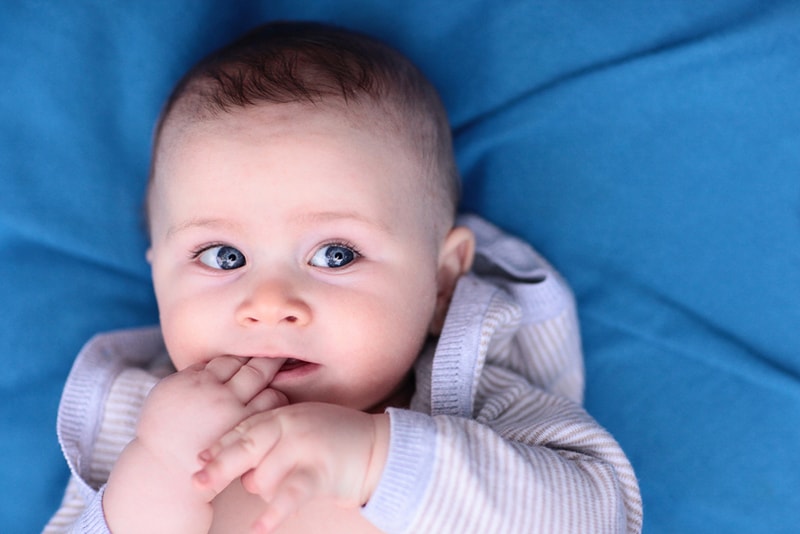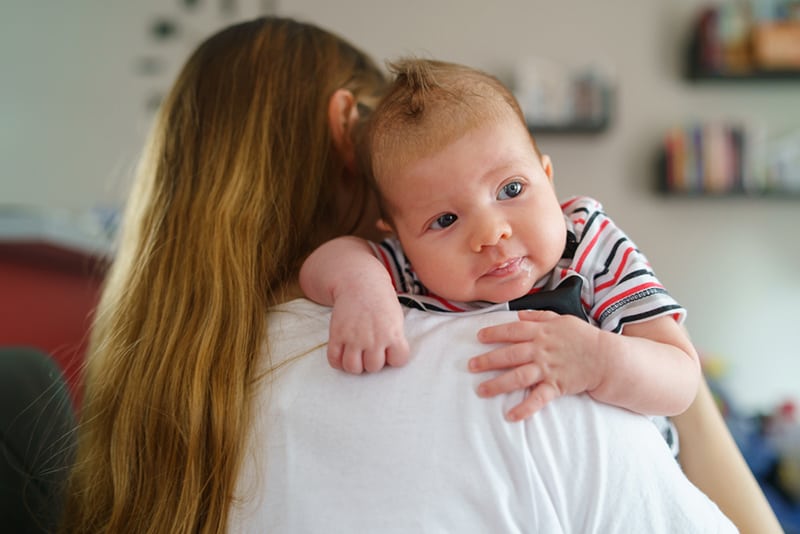Although babies aren’t exactly eloquent, they use a range of different cues to let you know what they need.
When you notice your baby smacking lips, you might be wondering what all this is about.
Lip-smacking is a common and normal habit of babies.
Some use it to express hunger, others do it while they’re teething, and some babies smack their lips just because they find it fun.
It’s not dangerous and it rarely, if at all, indicates a serious problem.
Still, you should monitor when your baby does it to see if there’s a pattern.
Since most infants tend to smack their lips when they’re hungry, a lot of parents get concerned when their baby does it after a feed.
They often wonder if it’s a sign that their baby isn’t getting enough to eat.
That depends on whether your child is having a growth spurt and other factors too.
There are babies who do this as a self-soothing tactic after a feed, so it’s not always an indicator of hunger.
I’ve also compiled a list of other common infant cues that will help you better communicate with your baby until he gets old enough to speak his mind!
Baby Smacking Lips – Causes
You might notice one day that your little one is smacking his lips.
At first, you find it cute, but then you get a little concerned, especially if lip-smacking becomes a frequent habit.
A baby smacking his lips can have many causes but it’s rarely dangerous or indicative of a serious problem – so feel free to relax!
Here are some of the most common reasons why your baby is smacking his lips:
1. Your baby is fascinated by the sensation

A lot of parents tend to forget that their baby finds everything fascinating!
Every day is a different adventure, and there’s always something new to learn.
And when a baby learns how to create a particular sensation, it’s not unusual for him to go through a phase where he does it all the time.
This is common with lip-smacking and sucking on the lower lip too so don’t be surprised if your baby goes through phases where all he wants to do is smack his lips or suck on his bottom lip.
Simply put, it’s a way for your baby to experience different sensations and it’s a perfectly normal part of development.
Many parents find that their babies start doing this when they’re around 4 months old.
2. Your baby is teething

Those first baby teeth are a huge milestone!
But when they start coming in, it’s far from comfortable for your little one.
Some babies start smacking their lips as the teething process starts.
Usually, baby teeth start growing around 6 months of age.
However, if you have a 4-month-old who is displaying symptoms of teething, this is completely normal as well.
Apart from the baby smacking his lips, there are other symptoms of teething to keep in mind:
• Excessive drooling
• Baby develops a habit of chewing and gnawing on everything in sight
• Fussiness
• Mild fever
• Baby’s gums are inflamed and red
• Baby rubs his ear
The arrival of new teeth can also cause your baby to wake up more frequently during the night.
However, some babies have milder symptoms than others, so don’t expect your little one to check off every single one of them.
When it comes to remedies for teething infants, there are various ones you can try, such as:
• Teething toys
• A cold washcloth
• Chamomile tea
• Breastfeeding (if applicable)
• Frozen fruit in a mesh feeder
3. Your baby has gastroesophageal reflux

Gastroesophageal reflux or GER for short is a condition when the food in the stomach comes back up, causing the baby to spit up or even throw up.
It’s quite common in newborn babies but as your baby gets older, the symptoms should become milder.
Symptoms of GER include:
• Baby smacking his lips
• Spit-up
• Fussy behavior
• Coughing
• Loud breathing
• Baby doesn’t get enough milk during feedings
If you suspect that GER could be the cause of your baby smacking his lips, then you should talk to your pediatrician.
It’s important to note that both formula-fed and breastfed babies can have GER.
A common treatment of GER includes adding rice cereal to breast milk or baby formula.
There are also special formulas for babies with reflux that you can try, as well as hypoallergenic formulas like Similac Alimentum and Enfamil Nutramigen.
For more severe cases, doctors often recommend special formulas like Elecare or Neocate.
A more upright breastfeeding or bottle-feeding position may also help.
4. Your baby might be ready for solid foods

According to the Centers for Disease Control and Prevention, most infants can start eating baby food like veggies, meat, and fruit around 6 months of age.
Although a baby smacking his lips is not the only nor the most important sign of a baby being ready for solids, it is a part of the overall development of your baby’s interest in food.
The key signs that your baby is ready for solids are:
• Baby can support his own head when sitting.
• Baby seems to be curious about the food you’re eating.
• Baby doesn’t display the tongue-thrust reflex anymore.
Another trick you can try to see if your baby is ready for solids is to bring a spoon to his mouth.
If he opens his mouth, then it’s a good sign he already knows what to do to eat.
When your baby is ready, put him in a high chair and slowly offer a little bit of food in a spoon.
It’s important not to have any expectations going into this process and let your baby explore these new flavors without the pressure of actually eating.
Some parents choose to forgo the spoon and opt for baby-led weaning, which means offering your baby finger foods he can pick up and eat on his own.
Once you see that your baby is turning his head away from the spoon, then it’s time to put an end to the feeding.
If you insist on your baby trying more food, this could create negative associations with solids and cause more resistance in the future.
5. Your baby is hungry

Your baby’s hunger cues are one of the most important things to learn as a new parent.
Your infant can’t verbalize that he’s hungry, so you should be aware of all the cues that indicate it’s time to feed.
An important thing to know about crying is that it’s a very late hunger cue.
Most of the time, your baby will give you plenty of signals beforehand, so pay attention to what they are.
Some of the early signs of hunger include:
• Lip-smacking
• Making sucking noises
• Baby starts opening his mouth
• Begins sucking on his fingers, toes, hands, or anything he can grab a hold of
As the hunger progresses, the rooting reflex kicks in and the baby starts moving around.
If you don’t feed him at this point, then the baby will start crying and you’ll need to soothe him before offering him a bottle or nursing him.
Some parents notice their baby smacking his lips after eating, making them wonder if their baby is getting enough food.
This is particularly challenging for moms who breastfeed as they don’t know exactly how much milk their new baby had to drink.
First, you might want to check if your baby is going through a growth spurt.
Major growth spurts happen at different stages of the baby’s development, including at 3, 6, and 9 months of age.
During this period of time, it might seem like your baby is constantly hungry.
However, if your child isn’t going through a growth spurt but is still gaining weight at a healthy rate, then the lip-smacking is likely just a phase he’ll grow out of.
6. Your baby is sleepy

Some babies smack their lips when they’re tired and ready to be soothed to sleep.
So if you’ve just fed your child and he continues smacking his lips, it could be because he wants to doze off.
Other Important Infant Cues

One of the best ways to learn how to respond to your infant’s needs is to learn his cues.
I’ve already covered hunger cues above, so here I’ll focus on some other ones.
Fullness
Knowing when your child is full is important to avoid overfeeding. Your baby will exhibit different signs of fullness depending on his age.
Up to 6 months, a baby who is full will relax his hands, turn away from the breast or bottle, and will close his mouth.
After 6 months of age, your child will get much more expressive at letting you know he’s full.
He might close his mouth and move away, or will use his hands to signal he doesn’t want to eat anymore.
Illness
If your baby is sick, the symptoms will depend on the type of illness he has.
Here, I’ll be focusing on the symptoms of the common cold as you’ll have to deal with it at least once during your baby’s first year.
If your baby has caught a cold, the obvious signs are a runny nose and nasal congestion.
But your child might also eat less because a stuffy nose makes it difficult to breastfeed or drink from a bottle.
You can ease his congestion by ensuring the air is humidified and using a nose aspirator.
RELATED: 14 Best Humidifiers For Babies For The Sweetest Dreams
You might also notice your little one is fussier than usual, has trouble sleeping, and has lost his appetite.
Happiness
We all know what an unhappy baby looks and sounds like!
But what are the cues that let you know your baby is happy, or at the very least, comfortable?
Before your baby can smile in earnest, a big sign of happiness is when he’s comfortable while you’re holding him, which means that your baby’s whole body is relaxed.
Between 3 and 6 months of age is when your baby will begin to laugh, so don’t hesitate to act goofy to hear that sweet chuckling!
Overstimulation
One of the reasons why it’s so challenging to take a baby someplace new for the first time is because you don’t know how he’ll react or whether he will get overstimulated and overwhelmed.
Flashing lights, loud noises, and crowds of people can all have an upsetting effect on your child.
When babies are overstimulated, they will try to look away and might even become fussy.
Covering their face and rubbing their eyes is another common sign.
If you notice your baby is getting really overwhelmed, it’s best to remove yourself from the environment you’re in and take the baby some place quiet and calm. A pacifier or a quick feeding session will help too.
The Bottom Line
Babies smack their lips for all sorts of reasons… Hunger, fatigue, as a way to soothe themselves, or just because they find it fun!
It’s not a cause for concern but feel free to mention this to your pediatrician at your baby’s next check-up if it’s been weighing heavily on your mind.
In some cases, it’s a symptom of GER but it would likely appear with many other symptoms as well, such as frequent yellow spit-ups, fussiness, and coughing.
Your baby might smack his lips as his teeth are growing, so be sure to connect this behavior to any developmental milestones your child could be experiencing.
Whatever the reason is – you can rest assured that your baby will quickly grow out of it!
References:
• Division of Nutrition, Physical Activity, and Obesity, National Center for Chronic Disease Prevention and Health Promotion. 2020, December 11. “When, What, and How to Introduce Solid Foods”. Centers for Disease Control and Prevention website.
Like this post? Please share or pin it for later. You can also stay in the loop and follow us on Facebook, Instagram or Pinterest.

We love honesty! Find Your Mom Tribe is an Amazon Associate and we earn from qualifying purchases through affiliate links at no extra cost to you. Please see our full Amazon Affiliate disclosure for more information.

